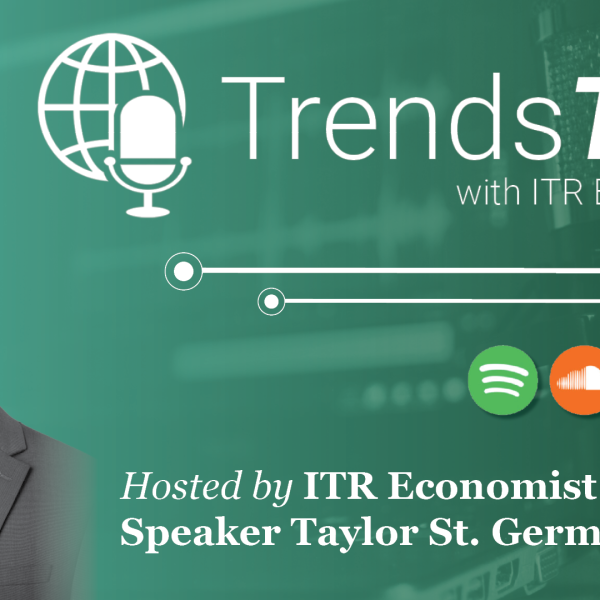- Mon - Fri: 8:30 - 5:00
- +1-603-796-2500
- ITR@itreconomics.com
November 4, 2022
- Home
- portfolio
- TrendsTalk
- November 4, 2022
with BRIAN beaulieu
FED FUNDS TARGET RATE INCREASE: WHAT THIS MEANS NOW
There has been an increase in the Federal Funds Target Rate. Find out what this increase means for the economy now with the latest episode of TrendsTalk with ITR CEO and Chief Economist Brian Beaulieu. Please note this episode was recorded on November 1, 2022.
The below transcript is a literal translation of the podcast audio that has been machine generated by Rev.
Hi, this is Brian Beaulieu , CEO, Chief Economist for ITR` Economics. Thank you for joining me for this edition of TrendsTalk. It’s November 1st. The Fed is convening their meeting to decide what to do about interest rates, specifically the Fed Funds Target Rate. And it seems to be a foregone conclusion that they’re going to be raising 75 basis points, so up to 4.0%. And everybody seems to be on edge, anxious to find out if they’re going to go another 50 or 75 in December. From our perspective, going 75 tomorrow is going to inflict enough damage as it is that really what happens in December may become moot. We’ve had an inverse yield curve between the 10 year and the 30 day for a couple of days now, and as we’ve just mentioned, you need a couple of months before statistically significant. But if they raise 75 bps tomorrow, I’d be hard pressed to see how we’re going to get a reversal in this yield curve given that the long bond is coming down in yield while the Fed is relentlessly driving the short side higher.
And Chairman Powell’s own preferred yield curve, which is different than what we use, is showing it’s 0.2 percentage points away from inverting itself. And all we can do is hope that he’s looking at that and realizing he doesn’t want to create this inversion, he and his colleagues don’t want to create the inversion. Not at all confidence that they’re going to do that. They seem to be impatient in terms of seeing inflation come down. It is coming down, it’s just not coming down fast enough. As we have stated before, they can’t control the labor shortage. So what they’re trying to do is try and take away the demand for labor and thinking that’s going to lower prices. Well, it won’t lower labor prices. It may flatten them out, but when we talk to our clients, they’re already planning on minimal or much smaller increase in labor in 2023 than what they had to do in 2022. The process, in other words, is working because intelligent business people are making decisions. But again, they seem to be determined that they want to create an environment where we don’t want to hire more people. Food is also an ongoing inflation issue, but they can’t control food prices. They’re not in charge of the war, they’re not in charge of weather, and that’s why usually food and fuel are beyond their purview. Which gets us back to the labor being the burr underneath their saddle.
If they go to 75 bps this week, then my colleagues and I will start assessing the probabilities of a recession starting in 2024 instead of 2025. Want to give you a heads up that that’s what it would mean if the inverse yield curve is sustained. We would have to come up with a significantly or appreciably changed forecast for 2024 because of this headstrong action. It amazes me. ITR isn’t alone in thinking that disinflation is here and that inflation is going to be coming down. It’s going to be coming down to what most people are considered to be acceptable levels by the end of ’23.
I’m not sure what the real hurry here is, but it’s not worth breaking the economy over. I’ve seen them do this too many times over the last 40 years to simply ignore this. So we’re going to try and get ahead of this and share with you our results as soon as possible. Watch the yield curve, it’s inverted. If it stays inverted, we get a problem. The Federal Reserve pushes up 75 bps, and even if they say in December they’re only going to go 50 basis points, we still have a problem and it’s likely to be enduring. So, wanted to share with you our thoughts about inflation, interest rates, and where our head is at. Thank you for listening to this edition of TrendsTalk. I’m Brian Beaulieu.





